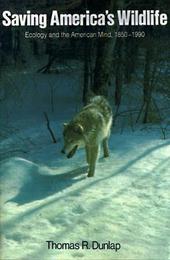
|
Saving America's Wildlife: Ecology and the American Mind, 1850-1990
Paperback / softback
Main Details
| Title |
Saving America's Wildlife: Ecology and the American Mind, 1850-1990
|
| Authors and Contributors |
By (author) Thomas Dunlap
|
| Physical Properties |
| Format:Paperback / softback | | Pages:240 | | Dimensions(mm): Height 229,Width 152 |
|
| Category/Genre | Management of land and natural resources |
|---|
| ISBN/Barcode |
9780691006130
|
| Classifications | Dewey:333.95160973 |
|---|
| Audience | | Professional & Vocational | | Tertiary Education (US: College) | |
|---|
|
Publishing Details |
| Publisher |
Princeton University Press
|
| Imprint |
Princeton University Press
|
| Publication Date |
21 February 1991 |
| Publication Country |
United States
|
Description
"Imagine an American of the 1850s listening to our debates over wildlife and wilderness," proposes Thomas Dunlap. "Coming from a society that was seeking to kill every wolf on the continent, what could he make of our plans to reintroduce the timber wolf into parts of its old range?" This history of wildlife preservation efforts goes far beyond the "good vs. bad" approach to help us see how and why Americans felt the way they did about wild animals--and how and why they have changed. Illustrating his points by an account of our evolving ideas about wolves and coyotes, Dunlap shows how American attitdues toward nature have been transformed during the last century.
Reviews"Beginning with nineteenth-century underpinnings to wildlife conservation, Thomas R. Dunlap's interesting book explores how we have deepened our commitment to and broadened the scope of animal conservation through the 1980s... A well-written and effective statement."--Robin W. Doughty, The Journal of American History "Dunlap uses animals to tell a fable about human values... The fabular quality of the book comes through in its slim size, its deft distillation of mountains of source material, its frequently epigrammatic language, and its singular focus on how science has revolutionized the intellectual and mythic landscape of American civilization."--Stephen J. Pyne, Pacific Northwest Quarterly "A major contribution to American intellectual and environmental history."--Roderick Frazier Nash, Western Historical Quarterly
|